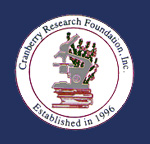

Research Projects
![]() Research Projects
Research Projects
The Cranberry Research Foundation (CRF) makes an ongoing effort to strategically fund projects that have immediate impact on the ability of Massachusetts cranberry growers to grow cranberries. CRF focuses on projects that improve the sustainability of cranberry production while protecting the environment.
In 2019, CRF is supporting the University of Massachusetts Cranberry Station to conduct multidisciplinary research and extension activities to maintain and enhance the economic viability of the Massachusetts cranberry industry. $25,000 has been awarded towards the research outlined below:
Discipline: Entomology. Conduct Spray Trials for Scale and Cranberry Weevil as Infestations and New Compounds Allow.
Principal Investigator: Anne Averill
Research Objectives:
- Conduct weevil resistance bioassays.
- Develop improved recommendations for two severe and worsening outbreak insects, scale and cranberry weevil.
Discipline: Plant Nutrition. Develop N Rate Response Curve for Second-Generation Hybrids and Compare These with Native and First-Generation Hybrids
Principal Investigator: Peter Jeranyama
Research Objectives:
- Determine effect of N rate on fruit yield and vegetative dry matter.
- Evaluate the effect of field or storage fruit rot as influenced by fertilizer N rate
- Determine effect of N rate on fruit quality (titratable soluble acids) and TAcy
Discipline:Plant Physiology. Identify Cultivars Historically Associated with Poor Red Color Development and Low Fruit Firmness
Principal Investigator: Giverson Mupambi
Research Objectives:
- Test different application rates and timing of applications that will induce anthocyanin biosynthesis for the optimal red color in the TAcy range that earns growers maximum returns.
- Identify cultural practices that might influence the large differences observed in fruit firmness.
- Test if a plant growth regulator can be used to control the ripening process through temporary inhibition of ethylene biosynthesis and the resultant influence on phyiological maturity.
Discipline: IPM/Weeds. Conduct Efficacy Tests with Herbicides Registered for Other Crops to Evaluate Control of Grasses.
Principal Investigator: Hilary Sandler
Research Objectives:
- Assess crop safety of screened herbicides.
- Conduct field studies with different timings and compare single to mutliple applications for crop safety and efficacy against poverty grass.
Discipline:Plant Pathology.
Principal Investigator: Sai Sree Uppala
Research Objectives:
- Evaluate the efficacy of alternative fungicide regimes for fruit rot disease control and yield.
- Evaluate the effects of fungicide application timings on fruit color, size and firmness.
-
Funded for 2018:
Title: Defining New Approaches to Weed Management in Cranberry
Principal Investigator: Dr. Hilary Sandler, UMass Cranberry Station
CRF funds:$7,522
Title: Breeding and Genetics of the American Cranberry: Enhancing Fruit Rot Resistance and Fruit Quality
Principal Investigator: Dr. Nick Vorsa, Rutgers
CRF funds:$15,000
Title: Understanding the Cranberry Fruit Rot Complex: Identifying Risk Factors Associated with Infection, and Idea to Survey Osmia and Megachile Bees
Principal Investigator: Dr. Dawn Wells-Hansen and Dr. Erika Saalau-Rojas, Ocean Spray
CRF funds:$3,000
Funded for 2017:
Title: Defining New Approaches to Weed Management in Cranberry
Principal Investigator: Dr. Hilary Sandler, UMass Cranberry Station
CRF funds: $33,854
Research Objectives:
- Screening novel herbicides.
- Establish use patterns for new herbicide Aime EC.
- Establish use patterns for Kerb.
- Investigate QuinStar mechanism of delatyed efficacy against dodder.
Funded for 2016:
Title: Cranberry Insect Research: Scale Pest Management
Principal Investigator: Anne Averill, UMass Cranberry Station
CRF funds: $5,000
Research Objectives:
- Scales - insecticide screen and monitoring.
- Scales - scouting techniques and biocontrol.
- Pollination - cage studies.
- Pollination - is cranberry safe for bees?
Title: Effect of Fungicide and Timing of Application on Cranberry Fruit Rot
Principal Investigator: Dr. Erika Saalau Rojas, UMass Cranberry Station
CRF funds: $20,698
Research Objectives:
- Develop fungicide regimes that effectively control field and storage fruit rot and perserve fungicide utility.
- Evaluate the efficacy of two commercial formulations of polyoxin-D zinc salt, isofetamid (4th generation SDHI fungicide), and a plant biofungicide in combination with broad spectrum and reduced-risk fungicides against cranberry fruit rot.
- Evaluate the timing of fungicide applications based on bloom phenology to determine the critical window for fungicide application.
Title: Urinary Proteome and Fecal Microbime Markers of Gut Barrier Dysfunction
Principal Investigator: Christian Krueger, University of Wisconsin
CRF funds: $5,000 (Total funding for project is $145,000)
Research Objectives:
- Conduct a 20 subject clinical study to evaluat ethe ability of FWCP to improve gut barrier function in an obese but otherwise healthy human population.
- Quantify urinary protein markers of GBD by Linear Quadrupole Ion Trap (LQT) Orbitrap Mass Spectrometry.
- Quatify gut barrier permeability by analysis of lactulose and L-rhamnose ratios in urine 6 hours after oral injestion of multi-sugar drink.
- Perform non-directed LTQ Orbitrap mass spectrometry analysis to identify shifts in urinary protein modulators of systemic diseases.
- Perform mulitplix16S rRNA analysis to identify fecal microbiome shifts in response to FWCP consumption.